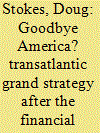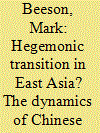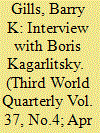| Srl | Item |
| 1 |
ID:
122269


|
|
|
|
|
| Publication |
2013.
|
| Summary/Abstract |
As China rises, the popular wisdom is that the US is in inexorable relative economic decline. A rapid loss of US power would affect the national-security interests of its close allies, particularly the UK. However, Doug Stokes argues that America's decline is not as pronounced as is commonly assumed. Even after the crisis, it remains, fundamentally, economically sound and its strategic power in important parts of the world means it retains the tools to manage a potential 'hegemonic transition'. Nonetheless, the financial crisis has quickened structural shifts in transatlantic relations, which will inevitably have an impact on European strategy.
|
|
|
|
|
|
|
|
|
|
|
|
|
|
|
|
| 2 |
ID:
086444


|
|
|
|
|
| Publication |
2009.
|
| Summary/Abstract |
The 'rise of China' is seen by some observers as a precursor of inevitable hegemonic competition in East Asia. At the very least, it seems likely that China's influence in East Asia will grow at the expense of the United States. Whether this will eventually amount to a form of 'hegemonic transition' is far less clear. It is, therefore, an opportune moment to consider the relative strengths and weaknesses of China and the US in East Asia. This paper suggests that the nature of hegemonic competition and transition is more uncertain and complex than some of the most influential theoretical understandings of hegemony would have us believe.
|
|
|
|
|
|
|
|
|
|
|
|
|
|
|
|
| 3 |
ID:
144262


|
|
|
|
|
| Summary/Abstract |
In this interview Boris Kagarlitsky discusses the significance of contemporary ideas surrounding South–South Relations, the continuities and discontinuities between the ‘global South’ and previous notions of the ‘Third World’, and whether such changes in the world economy of over the past half a century can be understood as a form of hegemonic transition. Kagarlitsky also addresses the role of the various social forces and movements of the global South within these emerging South–South relations. Finally, he addresses the question of the role of the Russian Federation in the world system following the global crisis.
|
|
|
|
|
|
|
|
|
|
|
|
|
|
|
|